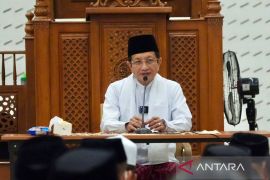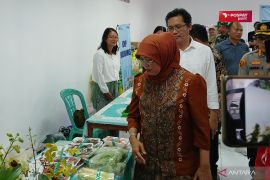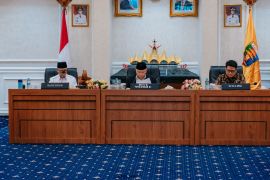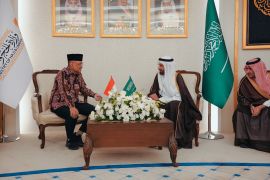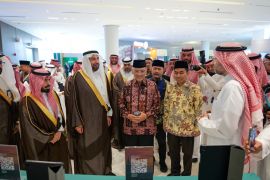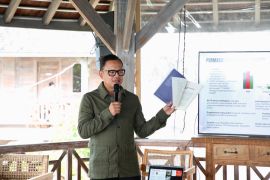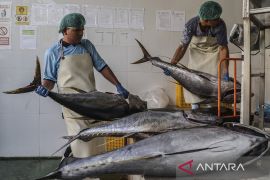Southwest Maluku district`s numerous islands make its transportation infrastructure heavily dependent on maritime transport.
Its sea territory covers 89 percent of the total area of 8,600 square kilometres, with a population of 73,000 people, but the inter-island transportation consists mainly of traditional boats.
Besides, the mode of land transport on the islands of MBD is still inadequate and the local people have to travel on foot for hours to reach their destinations, including schools.
Of all the islands in the district, only Kisar, Leti and Moa have some paved roads but most outlying islands have few or no roads, with transportation infrastructure consisting of walking trails.
"The Southwest Maluku district is actually endowed with abundant natural and mineral resources but they have not increased our prosperity," some of the local people complained.
There is a lack of land transportation and road networks on most of the islands in the district, but the local government is now focusing its attention on the development of Tiakur on Moa Island, chosen as the site of the MBD district administration centre.
"Many more hamlets and villages remain isolated and will continue to be isolated if nothing is done about it immediately," said Oyang Orlando, a youth figure of Kisar island.
Orlando pointed out that road infrastructure and inter-island sea transportation problems should be addressed immediately to enable the villagers to market their crops and marine products of fish, sea cucumbers, seaweed and other commodities to nearby towns and cities.
In the tentative district administration center of Wonreli in Kisar, for instance, many roads have been paved but some of them are already in poor condition.
"It is because the local government is now focusing its attention on the development of infrastructure in Tiakur in Moa and is ignoring the condition of damaged roads in Kisar," Orlando continued.
The road from Wonreli to Oirata village is dotted with a large number of potholes that raise the risk of accidents for motorists.
Consequently, the motorists, especially motorcyclists, have to be very careful along the damaged road leading to Oirata.
"I was traveling at a speed of about 20 km per hour from Wonreli to Oirata and slowed down ahead of all known and visible potholes but still my motorcycle managed to bump into a big pothole that was not clearly visible," said one of the motorcyclists, John Kamanasa.
He added that he only sustained minor damage to his motorcycle but his head was still ringing from the accidental jolt he received.
According to him, the motorcyclists have to pay hundreds of thousands of Rupiah to have their tyres and wheel rims replaced after hitting potholes along the road.
Therefore, Simon Moshe Maahury, former MBD transportation official asked for the transportation infrastructure to be managed well and properly.
"Poor infrastructure is still a big issue that must be overcome as soon as possible. Otherwise, it will hinder the pace of regional development," Maahury said.
The problem of poor transportation facilities and infrastructure in the district with many islands merits government attention in order to shorten the span of control and to increase accessibility and mobilization of people and goods.
Maahury admitted that land transportation facilities of roads and bridges were far from sufficient in Southwest Maluku while the air transportation, even with the presence of the Purpura airport on Kisar Island, was still inadequate to accommodate the ever-increasing demand.
With the population dispersed thinly across the islands, he said that the cost of providing transportation, infrastructure and social services to the local population was high.
These costs rise even more markedly on the remote islands of Lakor, Sermata, Romang and Damer, severely limiting the range of economic activities available to the local communities.
Inter-island transportation services are infrequent, expensive and problematic.
Most of the people on these islands have to travel for days by boat to reach the health centre or hospital on Kisar Island.
More than half of the inhabited islands are not always accessible due to problems with harbours and absence of jetties.
But Southwest Maluku District head, Barnabas Orno said that to consolidate the population and promote employment opportunities, the local government was developing two regional growth centres in Kisar and Moa islands.
These centers will have airports and ports to provide better social services and infrastructure to the people.
"A new airport is being built on Moa Island to bring tourism and other economic opportunities within the reach of the more isolated islands in the district," Orno said.
According to him, the Ministry of Transportation is currently constructing a new airport in Moa Island in an effort to end the isolation of Southwest Maluku district.
Moa, which is part of the Leti Islands group in Maluku province, is located close to Australia but has nothing to do with the Moa Island in the Banks Channel of the Torres Strait, Queensland; nor the extinct giant flightless bird native to New Zealand.
Orno admitted that the airport development with a runway length of 1200 meters in Moa Island started in 2011 and funding worth Rp25 million was provided by the central government for the first phase of the construction.
He noted that the additional airport in Moa and the existing one in Kisar are expected to compensate for the weakness of sea transportation and allow better connectivity with the rest of the country.
Currently, Kisar is connected through air transportation with Ambon and Kupang in East Nusa Tenggara, with scheduled flights once a week. Pioneer boats, which make stopovers at a number of ports on major islands, are also available, but it takes days to arrive at the desired destination. (*)
Reporter: Otniel Tamindael
Editor: Otniel Tamindael
Copyright © ANTARA 2012
